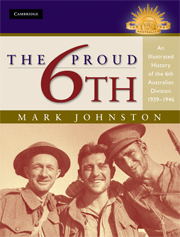Book contents
- Frontmatter
- Epigraph
- Contents
- List of Maps
- Acknowledgements
- Conventions and Abbreviations
- Introduction
- 1 Origins and Early Days
- 2 Bardia
- 3 Tobruk to Benghazi
- 4 Greece
- 5 Crete
- 6 Syria
- 7 Return to Australia
- 8 Kokoda to the Sea
- 9 Wau-Salamaua
- 10 The Longest Wait: Australia 1943–4
- 11 Aitape–Wewak
- 12 Conclusion
- Appendix 1 6th Division Casualties
- Appendix 2 6th Division Honours and Awards
- Notes
- Bibliography
- Index
3 - Tobruk to Benghazi
Published online by Cambridge University Press: 05 February 2015
- Frontmatter
- Epigraph
- Contents
- List of Maps
- Acknowledgements
- Conventions and Abbreviations
- Introduction
- 1 Origins and Early Days
- 2 Bardia
- 3 Tobruk to Benghazi
- 4 Greece
- 5 Crete
- 6 Syria
- 7 Return to Australia
- 8 Kokoda to the Sea
- 9 Wau-Salamaua
- 10 The Longest Wait: Australia 1943–4
- 11 Aitape–Wewak
- 12 Conclusion
- Appendix 1 6th Division Casualties
- Appendix 2 6th Division Honours and Awards
- Notes
- Bibliography
- Index
Summary
Three days after the fall of Bardia, the 16th and 19th Brigades had moved some 150 kilometres west along the Libyan coast and were outside the perimeter defences of Tobruk. While the Australians enclosed the eastern side of the fortress, the British 7th Armoured Division covered the roads leading south-west and west from Tobruk. Tobruk's 25 000 defenders were surrounded, but were well protected by an anti-tank ditch, wire and underground concrete posts. For more than two weeks, nocturnal Australian patrols secretly gauged the defences. A captain wrote of this period that his battalion were living on bully beef and army biscuits twice a day, with water rationed to one quart every 24 hours.
The attack that opened before dawn on 21 January was modelled on the Bardia operation. Engineers blew gaps in the wire and disarmed mines so that the British tanks – now numbering just 12 – could cross. Sapper Loubet declared Bardia a picnic compared to Tobruk, where his party were caught in enemy shellfire. There was another formidable supporting artillery bombardment, this time from even more guns, including a battery of the newly arrived 2/3rd Field Regiment. Again the 16th Brigade led the advance, this time with the 2/3rd Battalion in the van. By capturing five posts as planned, it cleared a breach for tanks and infantry to enter. While the 2/3rd continued marching west and capturing posts, the 2/1st entered the gap and pushed east, and the 2/2nd fanned out north beyond the perimeter. The Australians advancing towards Tobruk in Photograph 3.1 are possibly members of the 2/2nd. As the photograph shows, a cloud of dust, whipped up by shells, wheels and tracks, hung over the point where they entered the perimeter. Encountering relatively light resistance, the battalion captured 10 batteries and covered more than 3 kilometres in 2½ hours.
- Type
- Chapter
- Information
- The Proud 6thAn Illustrated History of the 6th Australian Division 1939–1946, pp. 46 - 63Publisher: Cambridge University PressPrint publication year: 2008

